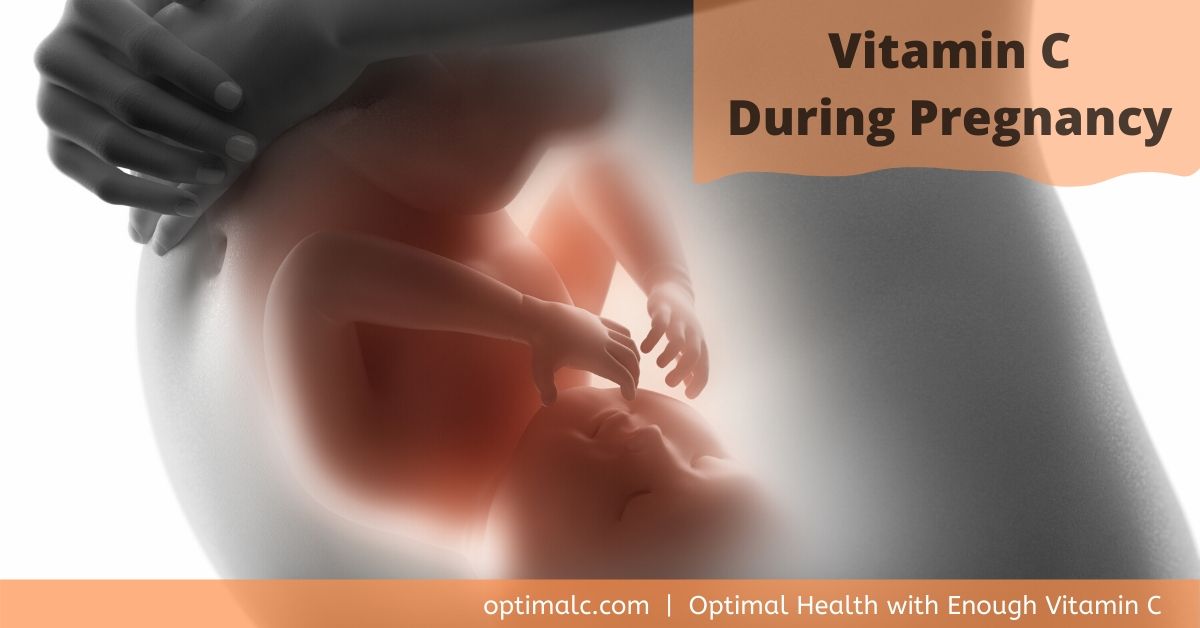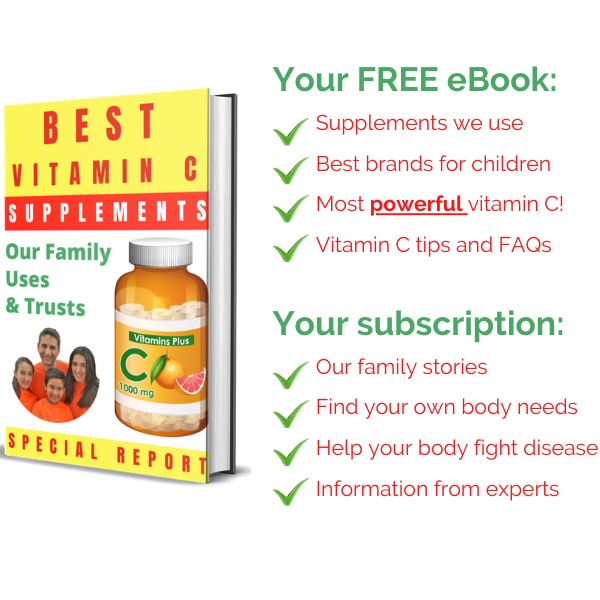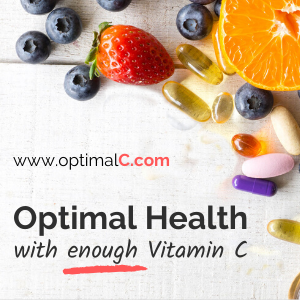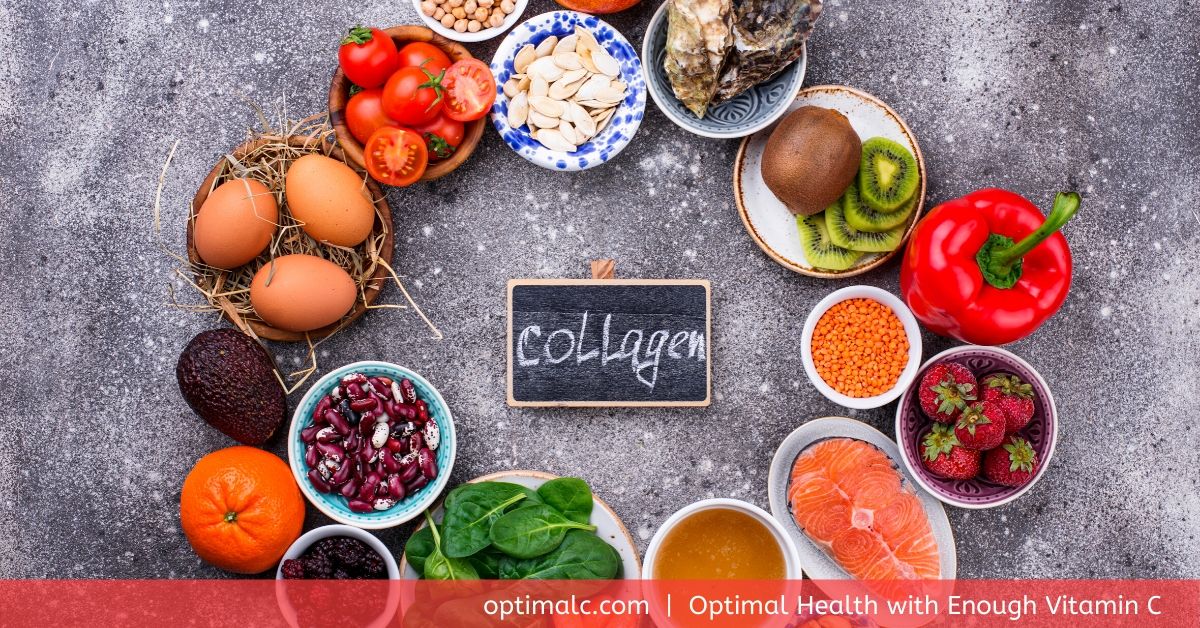Vitamin C During Pregnancy Benefits
By Arturo Galindo, Cert. Nutritional Therapist
Taking enough vitamin C during pregnancy has may benefits.
It's an easy and cost-effective therapy to support healthy pregnancies and babies. Thousands of women have used vitamin C in pregnancy. And it’s very safe.
My wife is one of these women. Our third baby born in December 2019 is a “vitamin C baby”.
In this blog post, you can find our story and all the important information we found during our research.
 Vitamin C During Pregnancy helps support healthy pregnancies and babies
Vitamin C During Pregnancy helps support healthy pregnancies and babiesWe've prepared this short video for you. You'll learn what our site is about and how you can use this information to improve your health...
Subscribe and Get Our Free eBook!
|
|
Important: Ascorbic acid or vitamin C is more than a vitamin.
Why? It regulates many functions in your body to make sure they're doing their best job in keeping you healthy!
|
Vitamin C RDA for Pregnant Females
The recommended daily allowance for pregnant and lactating women are set by the Food and Nutrition Board. As of January 2020, it’s set to 85 milligrams per day for females 19+ years. For nonpregnant females is 75 milligrams.
There’s a difference of only 10 milligrams per day to deal with the stress associated with pregnancy. This includes a developing baby, labor, milk production and recovery.
In the first 6 months of life, an infant demands about 40 milligrams of ascorbic acid per day. This extra load leaves the mother with 45 milligrams for her own body needs.
The question is, Is this amount enough for both the mother and the developing baby?
Pregnancy, Oxidative Stress, and Vitamin C
Here are some important considerations about pregnancy, oxidative stress, and vitamin C.
- Oxidative stress causes disease symptoms
- Pregnancy is not a disease, but it does increase oxidative stress
- Vitamin C, or ascorbic acid, prevents oxidative stress damage. It's one of the main benefits of taking enough.
- Ascorbic acid is vitamin C, but ascorbic acid is more than a vitamin. Each person needs it in varying amounts, often much larger than recommended amounts
- Ascorbic acid is not toxic
- Ascorbic acid does not deplete the body from other nutrients. It enhances how the body absorbs and uses other nutrients.
Also, here are some considerations about pregnancy in animals and Vitamin C
- Most animals make enough vitamin C to fight oxidative stress and disease symptoms
- Humans and most primates can’t make vitamin C
- Humans can supplement with enough ascorbic acid to prevent oxidative stress. And also stop disease symptoms quicker and safer.
- Pregnant mammals such as rats, produce more ascorbic acid to fight stress
Early in pregnancy, guinea pigs on a diet low in vitamin C led to abortion or absorption of the fetuses. Low vitamin C in the latter part of pregnancy caused stillbirths or premature, weak babies. You can find this in studies as early as 1915.
But how do animals make vitamin C? It turns out they convert glucose (blood sugar) to ascorbic acid. This is part of a process involves 4 enzymes.
And why can’t humans make vitamin C? The reason is that humans are missing one of these enzymes.
Vitamin C and Fertility
American Biochemist Irwin Stone dedicated 40 years to research ascorbic acid.
Stone wrote an amazing little book called The Healing Factor. Here he provides evidence of how vitamin C influences sexual activity and fertility.
This means that enough vitamin C may help with conception.
That’s right! Enough vitamin C means more sperm production and mobility. Here's the study from the University of Texas.
In the same book, there's a list of other studies with female mammals like guinea pigs.
It shows low vitamin C levels interfere with the female reproductive cycle. In fact, low vitamin C also causes male guinea pigs to lose their ability to get females pregnant.
The following is also reported
- Ascorbic acid is important in the ripening of the human egg
- Vitamin C injections on animals result in an increased probability of pregnancy. Studies in 1963 with cows show this.
Here's another interesting thing.
As far back as 1940, scientists proposed to use ascorbic acid to find ovulation times.
That's right! Ovulation tests using ascorbic acid! This measures different levels of vitamin C in the urine. And a low vitamin C level would signal the time of ovulation.
Safety of Vitamin C During Pregnancy
Vitamin C during pregnancy is very safe. We know because we’ve used it during our own pregnancy. And also because there have been several studies that prove it.
For example, in 1971, Dr. Klenner used high dose vitamin C in over 300 human pregnancies. He used anywhere between 4 grams and 15 grams daily.
Here are Dr. Klenner's study results documented.
Here are the doses of vitamin C that Dr. Klenner used for the patients:
- 4 grams daily in the first trimester
- 6 grams daily in the second trimester
- 10 grams daily in the third trimester
He noted that 20 percent of the patients required 15 grams daily in the third trimester.
Also, on admission to the hospital, 80 percent of the patients received 10 grams of ascorbic acid intravenously.
Keep reading to find the results of this amazing study.
But first, here are some studies on vitamin C during pregnancy.
This study shows how vitamin c can prevent Preterm Premature Rupture of Membranes (PROM)
And there's another study of over 2,000 women. It found an increased frequency of premature births in mothers with the lowest levels of ascorbic acid. It also reported brain development defects caused by vitamin C deficiency.
Benefits to Mothers During Pregnancy
Here are the results that Dr. Klenner reported after using vitamin C on 300 pregnancies:
- There were no miscarriages
- One woman had 10 consecutive normal pregnancies and ten healthy babies
- Labor was shorter, less painful and uncomplicated
- There were no postpartum hemorrhages
- Faster healing
- No signs of toxicity
- No cardiac stress even though 22 patients had “rheumatic hearts”
Benefits to Mothers After Delivery
How did the mothers feel after delivery of the 300 babies?
Dr. Kleener reported the following benefits:
- Stretch marks (striae gravid arum) were rare
- No postpartum hemorrhages
- Faster healing
- In multiple childbirths, the perineum area was as firm as that during the first childbirth. This was 15 to 20 years after the last childbirth
Benefits to Babies After Delivery
What about all the babies delivered by all 300 pregnancies?
- All were healthy babies
- All robust babies
- All strong, vigorous, and trouble-free babies
- The nurses in the Reidsville, N.C. hospital called them “the vitamin C babies”
Among these babies were the only quadruplets that survived in the southeastern United States at the time.
Dr. Klenner suggestions for the vitamin C babies were as follow:
- Give baby a fingertip of vitamin c 1-2 times per day for the first few months (about 50 milligrams daily)
- Increase the dose gradually until taking one gram of vitamin C at one year of age.
- Increase the dose 1 gram for each year of age until ten years
- Give ten grams of vitamin C daily after 10 years of age
Our Vitamin C Baby Story
Our third baby was a vitamin C baby. Here you can find our vitamin C pregnancy story.
In short, after two successful pregnancies, my wife developed postpartum preeclampsia. After two succesful pregnancies, we lost two babies to high blood pressure at 3-4 months.
This was despite the best efforts of my wife's doctor. Also, at the time, I had not done a lot of research on vitamin C during pregnancy.
Then I learned about the research work of Irwing Stone and Dr. Klenner's study on 300 pregnancies. And my wife and I decided to follow the advice.
We have the first-hand experience of all the benefits of vitamin C during pregnancy. Everything that Dr. Klenner reported is accurate based on our own experience.
Here are the best forms of vitamin C to take during pregnancy:
- Ascorbic acid is the safest, purest, and most effective form of vitamin c.
- If it is too difficult to take, mix magnesium carbonate in with the ascorbic acid to help balance the ph.
- Smaller doses of sodium ascorbate are okay. It’s not a good idea to take large doses because of the sodium
Should You Take More Vitamin C For Pregnancy?
This is a question that only you can answer after you draw your own conclusions.
Here’s a summary of the benefits of taking enough vitamin C during pregnancy.
- Increase fertility
- Prevent miscarriages and stillbirths
- Strengthen amniotic sac to prevent premature births
- Prevent hemorrhaging
- Prevent gestational diabetes
- Prevent other pregnancy complications (e.g. heart disease)
An average dose per day for pregnancy according to Dr. Klenner's recommendation is:
- 1st trimester is 4 grams
- 2nd trimester is 6 grams
- 3rd trimester is 10 grams
If you find you're pregnant and are currently taking a certain dose per day it's a good idea to continue the dose and break doses up throughout the day. Example: 1-2 grams every hour.
Lower the dose if you experience soft bowels.
Sources
- Stone, I. (1972) The Healing Factor, Vitamin C Against Disease
- Science Direct. Effect of ascorbic acid supplementation on the sperm quality
- Semantics Scholar. Observations On the Dose and Administration of Ascorbic Acid When Employed Beyond the Range Of A Vitamin In Human Pathology
- NIH. The Role of Vitamin C in Prevention of Preterm Premature Rupture of Membranes
|
|
By Arturo Galindo
Certified Nutritional Therapist I have used vitamin C and nutrition for over 10 years to end my chronic diseases and help my family stay healthy. Learn about our story.
|
Subscribe and Get Our Free eBook!
Related Pages
Our last pregnancy was a vitamin C pregnancy. Here you can find our story and how enough vitamin C helped mom and bay before, during and after pregnancy.
Follow us on Social Media!
How do you feel about what you just read?
Share This Page
One more way to share OptimalC.com ...
Would you prefer to share this page with others by linking to it?
- Click on the HTML link code below.
- Copy and paste it, adding a note of your own, into your blog, a Web page, forums, a blog comment, your Facebook account, or anywhere that someone would find this page valuable.











Facebook Comments
Have your say about what you just read! Leave a comment in the box below.